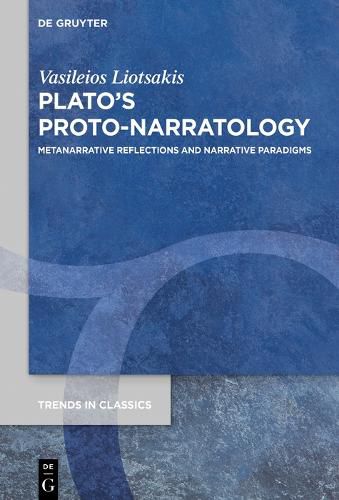Readings Newsletter
Become a Readings Member to make your shopping experience even easier.
Sign in or sign up for free!
You’re not far away from qualifying for FREE standard shipping within Australia
You’ve qualified for FREE standard shipping within Australia
The cart is loading…






This title is printed to order. This book may have been self-published. If so, we cannot guarantee the quality of the content. In the main most books will have gone through the editing process however some may not. We therefore suggest that you be aware of this before ordering this book. If in doubt check either the author or publisher’s details as we are unable to accept any returns unless they are faulty. Please contact us if you have any questions.
Plato's contribution to narratology has traditionally been traced in his tripartite categorisation of narrative modes we read of in the Republic. Although other aspects of storytelling are also addressed throughout the Platonic oeuvre, such passages are treated as instantaneous flares of metanarrative speculation on Plato's part and do not seem to contribute to the reconstruction of his 'theory of narrative'. Vasileios Liotsakis challenges this view and argues that the Statesman, the Timaeus/Critias and the Laws reveal that Plato had consolidated in his mind and compositionally put into effect one systematic mode in which to express his thoughts on narratives. In these dialogues Liotsakis recognizes the birth of a proto-narratology which differs in many respects from what we today expect from a narratological handbook, but still demonstrates two key-features of narratology: (a) a conscious focus on certain aspects of narrativity which are vastly discussed by narratologists and pertain to the structuring and reception of narratives; and (b) a schematised mode of interaction between metanarrative reflections and textual bodies which serve as the paradigms through which to explore the interpretive potential of these reflections.
$9.00 standard shipping within Australia
FREE standard shipping within Australia for orders over $100.00
Express & International shipping calculated at checkout
This title is printed to order. This book may have been self-published. If so, we cannot guarantee the quality of the content. In the main most books will have gone through the editing process however some may not. We therefore suggest that you be aware of this before ordering this book. If in doubt check either the author or publisher’s details as we are unable to accept any returns unless they are faulty. Please contact us if you have any questions.
Plato's contribution to narratology has traditionally been traced in his tripartite categorisation of narrative modes we read of in the Republic. Although other aspects of storytelling are also addressed throughout the Platonic oeuvre, such passages are treated as instantaneous flares of metanarrative speculation on Plato's part and do not seem to contribute to the reconstruction of his 'theory of narrative'. Vasileios Liotsakis challenges this view and argues that the Statesman, the Timaeus/Critias and the Laws reveal that Plato had consolidated in his mind and compositionally put into effect one systematic mode in which to express his thoughts on narratives. In these dialogues Liotsakis recognizes the birth of a proto-narratology which differs in many respects from what we today expect from a narratological handbook, but still demonstrates two key-features of narratology: (a) a conscious focus on certain aspects of narrativity which are vastly discussed by narratologists and pertain to the structuring and reception of narratives; and (b) a schematised mode of interaction between metanarrative reflections and textual bodies which serve as the paradigms through which to explore the interpretive potential of these reflections.